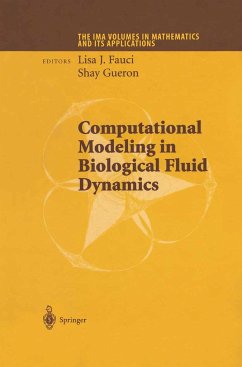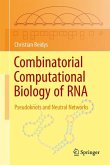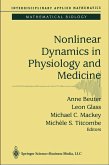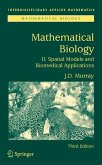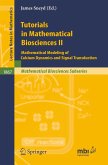This volume contains invited and refereed papers based upon presentations given in the IMA workshop on Computational Modeling in Biological Fluid Dynamics during January of 1999, which was part of the year-long program "Mathematics in Biology." This workshop brought together biologists, zoologists, engineers, and mathematicians working on a variety of issues in biological fluid dynamics. A unifying theme in biological fluid dynamics is the interaction of elastic boundaries with a surrounding fluid. These moving boundary problems, coupled with the equations of incompressible, viscuous fluid dynamics, pose formidable challenges to the computational scientist. In this volume, a variety of computational methods are presented, both in general terms and within the context of applications including ciliary beating, blood flow, and insect flight. Our hope is that this collection will allow others to become aware of and interested in the exciting accomplishments and challenges uncovered during this workshop.
This IMA Volume in Mathematics and its Applications COMPUTATIONAL MODELING IN BIOLOGICAL FLUID DYNAMICS is based on the proceedings of a very successful workshop with the same title. The workshop was an integral part of the September 1998 to June 1999 IMA program on "MATHEMATICS IN BIOLOGY." I would like to thank the organizing committee: Lisa J. Fauci of Tulane University and Shay Gueron of Technion - Israel Institute of Technology for their excellent work as organizers of the meeting and for editing the proceedings. I also take this opportunity to thank the National Science Founda tion (NSF), whose financial support of the IMA made the Mathematics in Biology program possible. Willard Miller, Jr., Professor and Director Institute for Mathematics and its Applications University of Minnesota 400 Lind Hall, 207 Church St. SE Minneapolis, MN 55455-0436 612-624-6066, FAX 612-626-7370 miller@ima.umn.edu World Wide Web: v PREFACE A unifying theme in biological fluid dynamics is the interaction of moving, elastic boundaries with a surrounding fluid. A complex dynami cal system describes the motion of red blood cells through the circulatory system, the movement of spermatazoa in the reproductive tract, cilia of microorganisms, or a heart pumping blood. The revolution in computa tional technology has allowed tremendous progress in the study of these previously intractable fluid-structure interaction problems.
Hinweis: Dieser Artikel kann nur an eine deutsche Lieferadresse ausgeliefert werden.
This IMA Volume in Mathematics and its Applications COMPUTATIONAL MODELING IN BIOLOGICAL FLUID DYNAMICS is based on the proceedings of a very successful workshop with the same title. The workshop was an integral part of the September 1998 to June 1999 IMA program on "MATHEMATICS IN BIOLOGY." I would like to thank the organizing committee: Lisa J. Fauci of Tulane University and Shay Gueron of Technion - Israel Institute of Technology for their excellent work as organizers of the meeting and for editing the proceedings. I also take this opportunity to thank the National Science Founda tion (NSF), whose financial support of the IMA made the Mathematics in Biology program possible. Willard Miller, Jr., Professor and Director Institute for Mathematics and its Applications University of Minnesota 400 Lind Hall, 207 Church St. SE Minneapolis, MN 55455-0436 612-624-6066, FAX 612-626-7370 miller@ima.umn.edu World Wide Web: v PREFACE A unifying theme in biological fluid dynamics is the interaction of moving, elastic boundaries with a surrounding fluid. A complex dynami cal system describes the motion of red blood cells through the circulatory system, the movement of spermatazoa in the reproductive tract, cilia of microorganisms, or a heart pumping blood. The revolution in computa tional technology has allowed tremendous progress in the study of these previously intractable fluid-structure interaction problems.
Hinweis: Dieser Artikel kann nur an eine deutsche Lieferadresse ausgeliefert werden.

